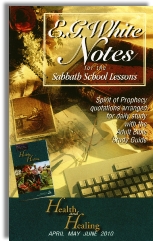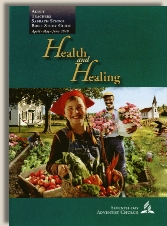|
||||||||||||||
Commentary on "The Power of Choice"
Day 1: Sabbath Afternoon, April 3, 2010
Overview
Sabbath afternoon’s lesson introduces us to the power of human choice by giving a life example. Two sisters grew up in the same positive environment, yet made very different life choices achieving radically different results. The studious sister now has an intact family and successful career, while the partying sister who dropped out of high school is now a single mother receiving welfare and drug rehabilitation. The Lesson states, “Both girls had the same opportunities, chances, and set of choices. Each is living with the consequences of those choices.”
We must make choices, and our choices have consequences that we must live with, the Lesson concludes.
Observations
Surely we must all make choices, and along with others in our sphere of influence, we live with the consequences. The Bible is clear that we are active agents in this world, and are asked to make wise choices according to God’s commands. Christians do not live under crude fatalism. However, the Bible is also clear that human history very quickly turned deadly by bad choices resulting in condemnation and death. We are all by nature “children of wrath” in rebellion against our Creator, and we all happily serve our lustful desires while enslaved to the god of this world (Eph. 2:1,2). That is the condition of every child born into this world, no matter what the circumstances might have been.
The story in today’s lesson does not state the spiritual condition of either of these women. That is unfortunate, because isn’t eternal life what really matter in all our stories? It is entirely possible that the sister with the job and husband is what Jesus called a “white-washed sepulcher,” while the other sister found another way. She may have hit rock-bottom, then was led to some Christians in Narcotics Anonymous, and is now a born-again believer who understands divine grace in a way that few can ever know.
Yes, choices have consequences, but where choices abound, grace can much more abound! This week’s lesson is an excellent opportunity to look at how a sovereign God rescues us from the tyranny of our enslaved wills and corrupt desires. Where do our wills find true freedom? The freedom that counts does not come from within, but from the One who said that if He makes us free, we are free indeed. Before such a rescue, there can be no freedom that really matters. Jesus Christ came to seek and save the lost, not those who win the lottery of better life choices.
Summary
- Christians are not fatalists, our choices have real consequences in this life.
- Before we know Jesus, we are all slaves to our own lusts and to the god of this world. We are not free to make good choices in that state.
- Though our original natures dictate choices for evil, Jesus comes to rescue to us by His Spirit and give us real freedom. Our wills become free to serve Him after He rescues us.
Copyright 2010 BibleStudiesForAdventists.com. All rights reserved. Revised April 3, 2010. This website is published by Life Assurance Ministries, Glendale, Arizona, USA, the publisher of Proclamation! Magazine. Contact email: BibleStudiesForAdventists@gmail.com.
The Sabbath School Bible Study Guide and the corresponding E.G. White Notes are published by Pacific Press Publishing Association, which is owned and operated by the Seventh-day Adventist church. The current quarter's editions are pictured above.
Official Adventist Resources
Standard Edition Study Guide Week 2
Teacher's Edition Study Guide Week 2
Easy Reading Edition Study Guide Week 2
Search the Complete Published Ellen G. White Writings


